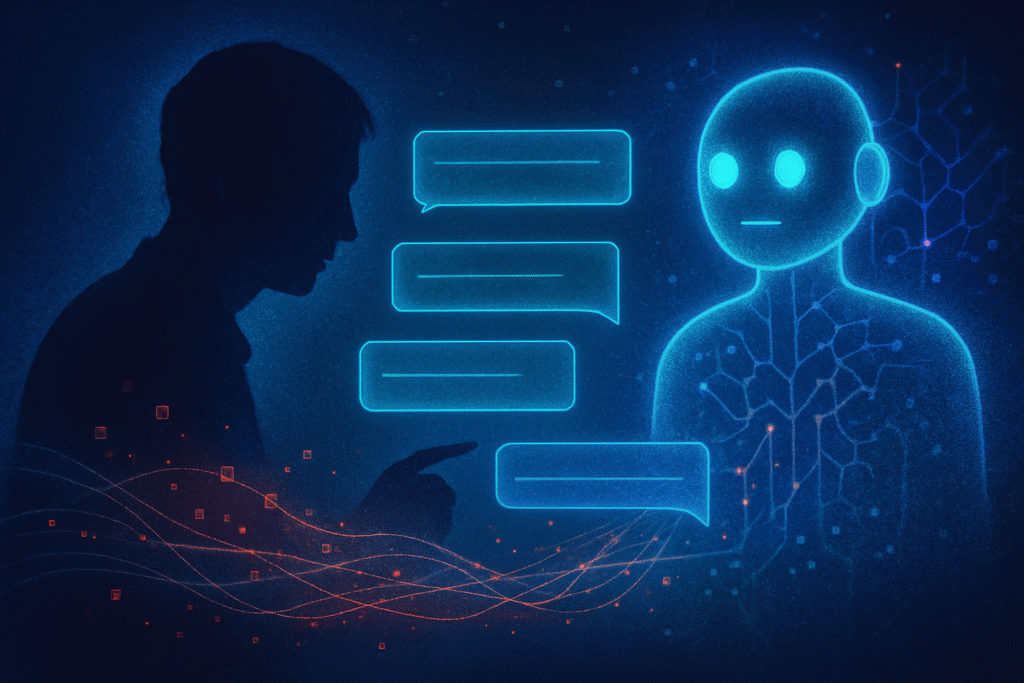
A groundbreaking study from the Stanford Institute for Human-Centered AI (HAI) has sent ripples through the artificial intelligence community, revealing that many leading AI companies are routinely using user conversations to train their sophisticated chatbot models. This pervasive practice, often enabled by default settings and obscured by opaque privacy policies, exposes a significant and immediate threat to user privacy, transforming personal dialogues into proprietary training data. The findings underscore an urgent need for greater transparency, robust opt-out mechanisms, and heightened user awareness in an era increasingly defined by AI interaction.
The research highlights a troubling trend where sensitive user information, shared in confidence with AI chatbots, becomes a resource for model improvement, often without explicit, informed consent. This revelation not only challenges the perceived confidentiality of AI interactions but also raises critical questions about data ownership, accountability, and the ethical boundaries of AI development. As AI chatbots become more integrated into daily life, the implications of this data harvesting for personal security, corporate confidentiality, and public trust are profound and far-reaching.
The Unseen Data Pipeline: How User Dialogues Become Training Fuel
The Stanford study brought to light a concerning default practice among several prominent AI developers: the automatic collection and utilization of user conversations for training their large language models (LLMs). This means that every query, every piece of information shared, and even files uploaded during a chat session could be ingested into the AI's learning algorithms. This approach, while intended to enhance model capabilities and performance, creates an unseen data pipeline where user input directly contributes to the AI's evolution, often without a clear understanding from the user.
Technically, this process involves feeding anonymized (or sometimes, less-than-perfectly-anonymized) conversational data into the vast datasets used to refine LLMs. The challenge lies in the sheer scale and complexity of these models; once personal information is embedded within a neural network's weights, its complete erasure becomes a formidable, if not impossible, technical task. Unlike traditional databases where records can be deleted, removing specific data points from a continuously learning, interconnected model is akin to trying to remove a single drop of dye from a large, mixed vat of water. This technical hurdle significantly complicates users' ability to exercise data rights, such as the "right to be forgotten" enshrined in regulations like GDPR. Initial reactions from the AI research community have expressed concern over the ethical implications, particularly the potential for models to "memorize" sensitive data, leading to risks like re-identification or the generation of personally identifiable information.
This practice marks a significant departure from an ideal where AI systems are treated as purely responsive tools; instead, they are revealed as active data collectors. While some companies offer opt-out options, the study found these are often buried in settings or not offered at all, creating a "default-to-collect" environment. This contrasts sharply with user expectations of privacy, especially when interacting with what appears to be a personal assistant. The technical specifications of these LLMs, requiring immense amounts of diverse data for optimal performance, inadvertently incentivize such broad data collection, setting up a tension between AI advancement and user privacy.
Competitive Implications: The Race for Data and Trust
The revelations from the Stanford study carry significant competitive implications for major AI labs, tech giants, and burgeoning startups. Companies like Google (NASDAQ: GOOGL), OpenAI, Anthropic, Meta Platforms (NASDAQ: META), and Microsoft (NASDAQ: MSFT) have been implicated in various capacities regarding their data collection practices. Those that have relied heavily on broad user data for training now face scrutiny and potential reputational damage, particularly if their policies lack transparency or robust opt-out features.
Companies with clearer privacy policies and stronger commitments to data minimization, or those offering genuine privacy-preserving AI solutions, stand to gain a significant competitive advantage. User trust is becoming a critical differentiator in the rapidly evolving AI market. Firms that can demonstrate ethical AI development and provide users with granular control over their data may attract a larger, more loyal user base. Conversely, those perceived as exploiting user data for training risk alienating customers and facing regulatory backlash, potentially disrupting their market positioning and strategic advantages. This could lead to a shift in investment towards privacy-enhancing technologies (PETs) within AI, as companies seek to rebuild or maintain trust. The competitive landscape may also see a rise in "privacy-first" AI startups challenging established players by offering alternatives that prioritize user data protection from the ground up, potentially disrupting existing products and services that are built on less stringent privacy foundations.
A Broader Look: AI Privacy in the Crosshairs
The Stanford study's findings are not isolated; they fit into a broader trend of increasing scrutiny over data privacy in the age of advanced AI. This development underscores a critical tension between the data-hungry nature of modern AI and fundamental privacy rights. The widespread use of user conversations for training highlights a systemic issue, where the pursuit of more intelligent and capable AI models often overshadows ethical data handling. This situation is reminiscent of earlier debates around data collection by social media platforms and search engines, but with an added layer of complexity due to the generative and often unpredictable nature of AI.
The impacts are multifaceted, ranging from the potential for sensitive personal and proprietary information to be inadvertently exposed, to a significant erosion of public trust in AI technologies. The study's mention of a decline in public confidence regarding AI companies' ability to protect personal data—falling from 50% in 2023 to 47% in 2024—is a stark indicator of growing user apprehension. Potential concerns include the weaponization of memorized personal data for malicious activities like spear-phishing or identity theft, and significant compliance risks for businesses whose employees use these tools with confidential information. This situation calls for a re-evaluation of current regulatory frameworks, comparing existing data protection laws like GDPR and CCPA against the unique challenges posed by LLM training data. The revelations serve as a crucial milestone, pushing the conversation beyond just the capabilities of AI to its ethical foundation and societal impact.
The Path Forward: Towards Transparent and Private AI
In the wake of the Stanford study, the future of AI development will likely be characterized by a strong emphasis on privacy-preserving technologies and clearer data governance policies. In the near term, we can expect increased pressure on AI companies to implement more transparent data collection practices, provide easily accessible and robust opt-out mechanisms, and clearly communicate how user data is utilized for training. This might include simplified privacy dashboards and more explicit consent flows. Regulatory bodies worldwide are also likely to intensify their scrutiny, potentially leading to new legislation specifically addressing AI training data and user privacy, similar to how GDPR reshaped data handling for web services.
Long-term developments could see a surge in research and adoption of privacy-enhancing technologies (PETs) tailored for AI, such as federated learning, differential privacy, and homomorphic encryption, which allow models to be trained on decentralized or encrypted data without directly accessing raw user information. Experts predict a future where "private by design" becomes a core principle of AI development, moving away from the current "collect-all-then-anonymize" paradigm. Challenges remain, particularly in balancing the need for vast datasets to train highly capable AI with the imperative to protect individual privacy. However, the growing public awareness and regulatory interest suggest a shift towards AI systems that are not only intelligent but also inherently respectful of user data, fostering greater trust and enabling broader, more ethical adoption across various sectors.
Conclusion: A Turning Point for AI Ethics and User Control
The Stanford study on AI chatbot privacy risks marks a pivotal moment in the ongoing discourse surrounding artificial intelligence. It unequivocally highlights that the convenience and sophistication of AI chatbots come with significant, often undisclosed, privacy trade-offs. The revelation that leading AI companies are using user conversations for training by default underscores a critical need for a paradigm shift towards greater transparency, user control, and ethical considerations in AI development. The decline in public trust, as noted by the study, serves as a clear warning sign: the future success and societal acceptance of AI hinge not just on its capabilities, but fundamentally on its trustworthiness and respect for individual privacy.
In the coming weeks and months, watch for heightened public debate, potential regulatory responses, and perhaps, a competitive race among AI companies to demonstrate superior privacy practices. This development is not merely a technical footnote; it is a significant chapter in AI history, forcing both developers and users to confront the intricate balance between innovation and privacy. As AI continues to integrate into every facet of life, ensuring that these powerful tools are built and deployed with robust ethical safeguards and clear user rights will be paramount. The call for clearer policies and increased user awareness is no longer a suggestion but an imperative for a responsible AI future.
This content is intended for informational purposes only and represents analysis of current AI developments.
TokenRing AI delivers enterprise-grade solutions for multi-agent AI workflow orchestration, AI-powered development tools, and seamless remote collaboration platforms.
For more information, visit https://www.tokenring.ai/.





